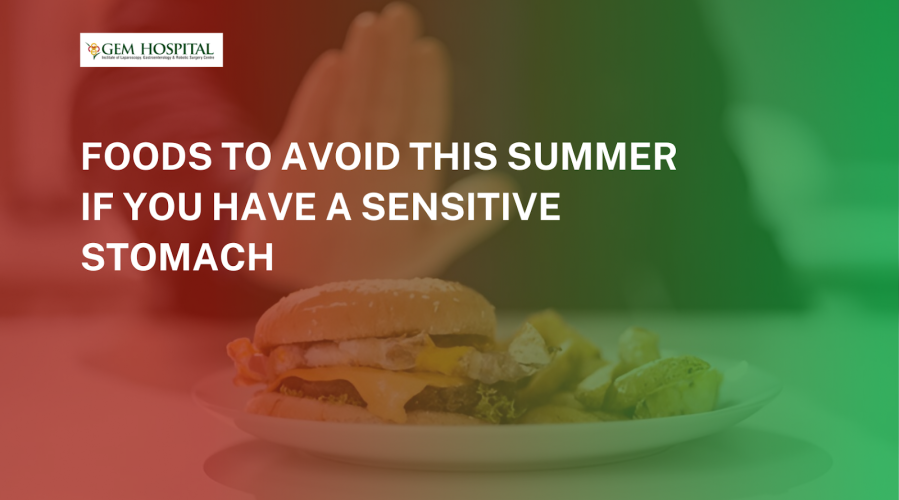Consult experienced hernia doctors in Chennai for expert surgical care. Advanced diagnosis, safe hernia surgery, and faster recovery with specialized treatment.
Foods to Avoid This Summer If You Have a Sensitive Stomach

Summertime arrives, and along with it come long sunny days, vacation time, and seasonal fresh foods. But for those with a sensitive stomach, the season may also bring a unique set of challenges. Higher ambient temperature, humidity, and preference of street foods or cold drinks can lead to discomfort of the digestive system. If you are someone who frequently battles with bloating, gas, acidity, or erratic bowel movements, you need to be even more careful of what you eat during the summer.
Knowing what to eat for sensitive stomach is crucial from preventing digestive upset and enjoying a healthy summer. Eat the wrong foods and you not only get the runs-but dehydration, infections, or chronic digestive disorders can materialize. A few tweaks to your diet will allow you to live it up this season while maintaining your gut happy and strong.
1. Spicy Foods
Spicy foods such as chilli-loaded curries and street-side chaats that you would be led towards on your outings this season are some of the foods to avoid for sensitive stomach. Spices such as chili powder, black pepper and garam masala can lead to the burning sensation in the stomach lining, cause an increase in acid secretion and has potential to heat up the body; causing digestive system to be at discomfort and leading to symptoms such as heartburn and diarrhoea. Your body will naturally dehydrate you more quickly in the summer, and spicy foods can compound that by causing you to lose more water through sweat and bowel movements.
To add flavor but not too much spice to your food, use mild spices such as cumin or coriander that aren’t as irritating to the digestive tract.
2. Fried and Greasy Foods
Another large subsection of foods to avoid for sensitive stomach are all the fried and oily ones – samosas, fries, pakoras, burgers. These foods are dense and need more time to digest, overloading your stomach in the process. The high fat and fiber content in avocados can clog up the system and slow digestion, contributing to gas, bloating, heartburn, and acid reflux.
In the summer, when our metabolism slows naturally to help us conserve energy in the heat, eating greasy food can make you feel weighed down and uncomfortable. Instead, opt for food that is lightly cooked, steamed or grilled and will be less harsh on your stomach.
3. Dairy Products
Ice creams, milkshakes, cold coffees -everything seems too tempting in summer! But dairy is surprisingly doesn't sit well on the stomach. In fact, many people suffer from lactose intolerance without even recognizing it – particularly as we begin to experience hotter temperatures and our bodies work harder to digest.
Milk and other dairy products ferment in the stomach and can result in gas, bloating and diarrhea. If you must partake, choose lactose-free alternatives (because, well, too much sugar isn’t a good idea either) or fermented forms of dairy, like yogurt, which are packed full of gut-supporting probiotics and slightly easier to digest.
4. Carbonated Drinks and Alcohol
One of the things people do that’s easiest to mess up is to consume carbonated sodas, beer or cocktails,” she says. Sorry to say but these drinks belong in the sensitive stomach foods to avoid. Bubbly beverages add even more air into your digestive system, causing you to feel bloated and uncomfortable. Alcohol, meanwhile, irritates the stomach lining and can irritate acid reflux.
Do not drink fizzy drinks but natural coolers such as coconut water, lemon water, or homemade buttermilk to keep yourself hydrated and save your gut.
5. Raw Foods and Salads (If Not Prepared Properly)
Raw vegetables and salad While raw veggies and salad might appear to be healthy, it can sometimes spell trouble for a delicate stomach, especially if they are unwashed or unprepared or contaminated in some way. Raw foods can have bacteria or pesticides that may irritate an already sensitive system.
In the summer, when bacteria grows fastest, the risk for food poisoning becomes greater. Always wash your vegetables, choose steamed rather than raw, and don’t eat raw food unless it has been prepared by someone you can trust.
6. High-Sugar Foods
Ice lollies, sweets, puddings and even some fruit juices are full of sugar that can upset delicate stomachs. The high sugar content disrupts the balance of beneficial and harmful gut bacteria, and can cause bloating, gas, and even diarrhea.
Satisfy your sweet tooth with fresh fruits such as watermelon, muskmelon or berries and you’ll stay naturally hydrated and nourished towards your food goals.
7. Artificial Sweeteners
Striving to keep sugar low can lead many people to look to diet sodas, or sugar-free gum. But who needs it when things like sorbitol and aspartame can sneak in and wreak havoc if you have a delicate stomach? They are poorly absorbed and can ferment in the gut, resulting in gas, bloating and diarrhea.
8. Caffeinated Beverages
It’s easy to chug several iced coffees or energy drinks to cool down and feel more awake, but caffeine is another irritant that puts stress on the digestive system. Extra caffeine revs up acid production, which not only allows the production of gas, but can also cause the esophageal sphincter to loosen up and allow acid to creep up into the esophagus, resulting in bloating and making IBS symptoms worse.
If you simply cannot function without your morning coffee, minimize your consumption to one cup of coffee a day (it’s that whole being-hydrated thing about having caffeine) and then make sure you are replacing any lost hydration through the day with water.
Protect Your Gut This Summer
If you’re the least bit sensitive of stomach, however, a few small dietary adjustments can be the difference between comfort and a slew of highly uncomfortable ‘tummy troubles.’ Concentrate on hydrating yourself, your diet should include light, freshly cooked meal, and you should mindfully keep away from the above list of food to avoid for sensitive stomach.
If you are still suffering from chronic stomach discomfort despite of taking these steps, it is important to seek advice from a specialist. Chronic digestive issues can't be ignored, especially since early intervention will prevent other unplanned more severe consequences.
We’re experts in all aspects of digestive health at GEM Hospital. If you are dealing with sensitive stomach symptoms this time of year, schedule an appointment with our specialty-trained gastroenterologists today. Let us ensure that you have a healthier, safer and worry free summer!
Blogs & Article
Get advanced liver transplant treatment in Chennai with expert surgeons, modern technology, and comprehensive care for safe and successful outcomes.
Get advanced piles treatment in Erode with expert doctors. Safe procedures, modern technology, and effective care for fast relief and recovery.


